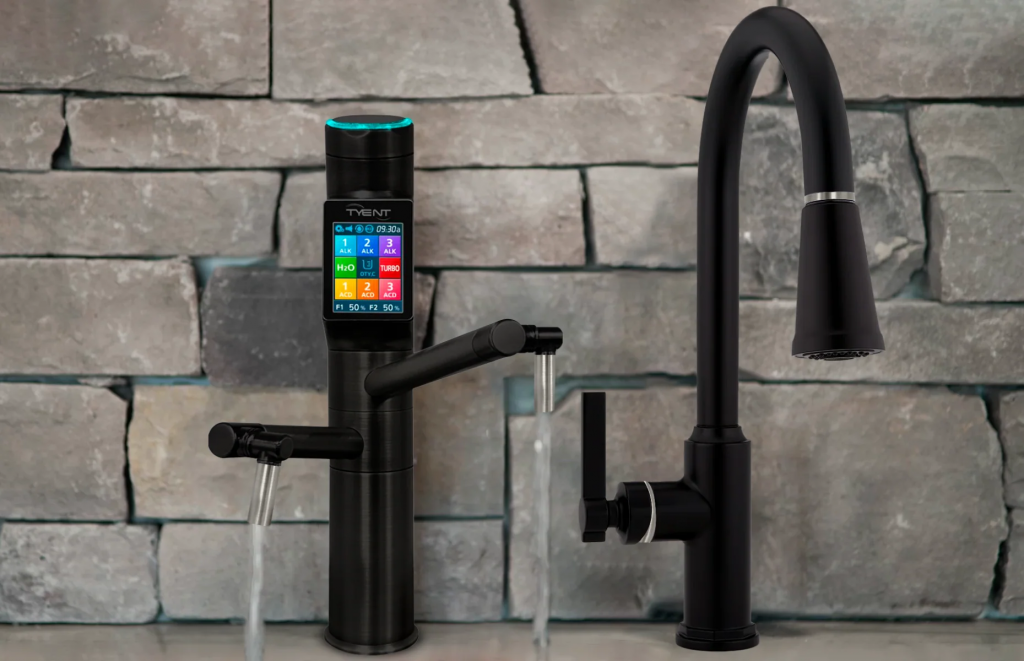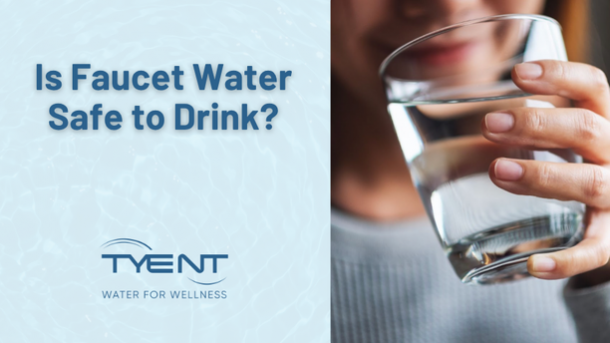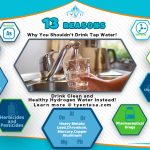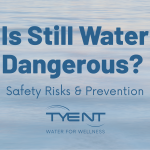Most U.S. tap water meets EPA standards, but aging pipes, chemicals, and pathogens can make it unsafe. Risks include lead, nitrates, and bacteria. The safest choice is advanced filtration with Tyent. Our ionizers remove lead and over 200 other contaminants while delivering hydrogen-infused water.
What You Need to Know:
- Most U.S. tap water meets EPA standards, but aging pipes, chemicals, and bacteria still pose risks.
- Lead, arsenic, and nitrates can’t be seen, smelled, or tasted, making them hard to detect.
- Bottled water isn’t always safer; many brands are just repackaged tap water.
- The only way to ensure consistently safe, health-boosting water is advanced home filtration with Tyent.
We created hydrogen water machines that remove over 200 contaminants (including lead) and infuse molecular hydrogen for antioxidant-rich hydration. With Tyent’s Dual Ultra Filtration and hydrogen infusion, you get water that’s not only safe but also actively supports energy, recovery, and longevity.
Is Faucet Water Safe?
Click here to learn more about why Tyent leads the way in filtration standards!
Faucet water can be safe, but it depends on where you live, your plumbing, and how you use it. EPA standards set a baseline, but hidden risks remain.
That’s why more families, athletes, and wellness seekers turn to Tyent: our systems remove over 200 contaminants, add hydrogen for powerful antioxidant benefits, and provide peace of mind with every sip.
Safe water shouldn’t be a gamble; it should be your daily guarantee.
Why Faucet Water Alone Isn’t Enough
Relying solely on faucet water means trusting outdated pipes, regional infrastructure, and limited EPA regulations.
Even if your water leaves the plant clean, it can pick up lead, copper, or microplastics before it reaches your glass. Add in unregulated contaminants like PFAS, and the risks increase.
We believe water should do more than just avoid harm; it should actively support your health. That’s why Tyent ionizers go beyond filtration, delivering water that is not only safer but energizing, hydrating, and life-enhancing.
What Determines Tap Water Safety?
Tap water safety isn’t the same everywhere. In the U.S., public water systems are regulated by the EPA, which sets standards for over 90 contaminants. Utilities must treat and test their water, but safety depends on more than compliance.
- Source: Water drawn from rivers, reservoirs, or wells faces different contamination risks. Agricultural runoff increases nitrate exposure in rural areas, while urban systems often struggle with lead leaching from aging pipes.
- Infrastructure: A city with decades-old plumbing may deliver water that left the plant clean but arrives at the tap carrying lead or copper.
- Individual Responsibility: For private well owners, there’s no regulation. Testing is up to the homeowner, leaving many unaware of the risks.
Common Contaminants Found in Faucet Water
Even treated tap water can contain contaminants that affect your health:
- Lead: A persistent threat in older homes, schools, and cities. Even trace amounts harm children’s brain development and increase miscarriage risk for pregnant women.
- Nitrates: Common in farming regions. In infants, they reduce blood’s ability to carry oxygen, leading to “blue baby syndrome.”
- Arsenic: A natural but toxic element linked to long-term cancer risks.
- Copper: Corrodes from pipes, causing stomach upset and other symptoms.
- Microorganisms: Giardia, norovirus, and Legionella can cause gastrointestinal or respiratory illnesses.
That’s why advanced filtration is so important. Tyent’s Ultra Plus filtration removes over 200 contaminants, including lead, chlorine, pharmaceuticals, and heavy metals, delivering water that’s cleaner than bottled.
Each system is engineered by certified water specialists and customized for your local water supply, ensuring you get the purest, safest, best-tasting water possible right from your tap.
Tyent’s Answer to Safe, Transformative Hydration

We’ve engineered our systems to solve the exact challenges faucet water presents:
- Filtration Power: Dual Ultra filters eliminate over 200 contaminants, including pharmaceuticals, lead, and PFAS.
- Hydrogen Advantage: Molecular hydrogen infusion turns clean water into antioxidant-rich hydration that supports energy, recovery, and healthy aging.
- Smart Design: Hybrid technology provides both alkaline and acidic water, making every drop functional, from drinking to cooking to skincare.
- Proven Quality: ISO, TÜV, and CE certifications, plus endorsements from athletes, doctors, and wellness experts.
With Tyent, you don’t just drink water. You drink the cleanest, freshest, hydrogen-rich water on Earth.
Explore our UCE-13 Plus, ACE-13, and Hybrid Ionizers today, because safe water is the beginning, but thriving starts here.

![EPA Drinking Water Quality Standards: Everything You Need to Know [2025] drinking water](https://www.tyentusa.com/blog/wp-content/uploads/2024/12/Screenshot-2024-12-02-082926-150x150.png)


